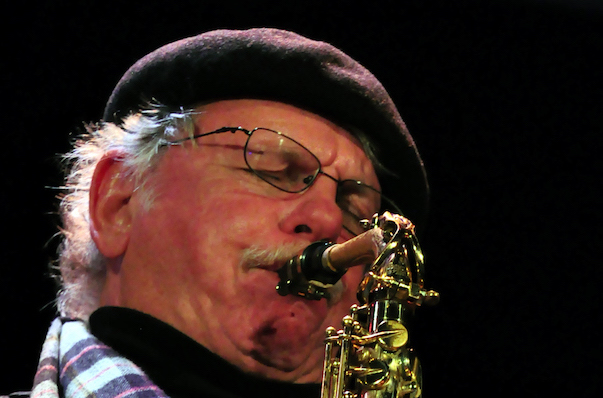Jan 13, 2026 2:09 PM
More Trump-Kennedy Center Cancellations
The fallout from the renaming of the John F. Kennedy Center for the Performing Arts to include President Donald…

Richie Cole (1948–2020)
(Photo: richiecole.com)Richie Cole, a renowned saxophonist who was championed by DownBeat early in his career and whose passion for bebop-era jazz dwelt at the heart of his exuberant Alto Madness performances and projects, died May 2 of natural causes in Carnegie, Pennsylvania, according to a report from WBGO. He was 72.
Cole recorded more than 50 albums, including his 1979 hit recording Hollywood Madness (Muse) and his 1997 tribute album to Leonard Bernstein, Richie Cole Plays West Side Story (Music Masters). In addition to leading his own bands at clubs and festivals worldwide, he spent much of his career collaborating with jazz heroes and peers like fellow alto saxophonists Art Pepper, Phil Woods and Hank Crawford, trumpeter Freddie Hubbard, vocalist Eddie Jefferson and the vocal ensemble Manhattan Transfer. He was a prolific composer, as well, penning more than 3,000 original compositions.
But it was Cole’s keening alto sound, speedy chops and freewheeling live performances that appealed to listeners and critics in the 1970s who shared his enthusiasm for the straightahead tradition. He was esteemed as a “keeper of the flame” whose burning playing style reflected an overt obsession with bebop.
“I play the alto saxophone, and frankly, I am a little crazy,” Cole explained in a 2016 DownBeat interview. “The word madness usually comes with a negative connotation. However, in my life, madness is everything that encompasses my style, passion and outlook on jazz. Because after all, it is a mad, mad, mad, mad world. The only thing that genuinely brings the people of the world together is music.”
Born Richard Thomas Cole on Feb. 29, 1948, he was exposed to jazz at a very young age by his father, a nightclub operator in his hometown of Trenton, New Jersey. Eager to learn and influenced by the sounds of Charlie Parker, Sonny Rollins and Sonny Stitt, he began playing alto saxophone at age 10 and went on to attend several music camps as a youth.
In 1966 Cole received a DownBeat scholarship to the Berklee School of Music in Boston, which he attended before leaving to join the Buddy Rich Big Band in 1969. He appeared on Rich’s live albums Buddy & Soul (World Pacific Jazz) and Keep The Customer Satisfied (Liberty).
After stints with the Lionel Hampton Big Band, the Doc Severinsen Big Band and the vocal ensemble Manhattan Transfer, Cole began leading his own quintet. He released his debut album, Trenton Makes, The World Takes (Progressive Recording Co.), in 1976. Cole’s 1977 album New York Afternoon (Muse) was the first of several recordings featuring Jefferson’s bebop-sourced vocalese.
Other notable Cole recordings include 1986’s Pure Imagination (Concord), 1993’s Profile (Heads Up), 1996’s West Side Story (Venus Jazz) and Richie Cole With Brass: Kush (Heads Up), and the 2006 release A Piece Of Jazz History (Jazz Excursion), recorded with Pepper in 1982.
More recent Cole albums include the independently released recordings Richie Cole: Pittsburgh (2015), Richie Cole Plays Ballads And Love Songs (2016), Have Yourself An Alto Madness Christmas (2016), Latin Lover (2017), The Many Minds Of Richie Cole (2017) and Cannonball (2018).
Cole was appointed to the Board of the National Jazz Service Organization and the Board for the National Endowment for the Arts, where he served as chairman for one year. He was also a charter member of the International Association of Jazz Educators.
Survivors include two daughters, Annie Cole and Amanda Marrazzo, as well as four grandchildren. DB

Belá Fleck during an interview with Fredrika Whitfield on CNN.
Jan 13, 2026 2:09 PM
The fallout from the renaming of the John F. Kennedy Center for the Performing Arts to include President Donald…

Peplowski first came to prominence in legacy swing bands, including the final iteration of the Benny Goodman Orchestra, before beginning a solo career in the late 1980s.
Feb 3, 2026 12:10 AM
Ken Peplowski, a clarinetist and tenor saxophonist who straddled the worlds of traditional and modern jazz, died Feb. 2…

The success of Oregon’s first album, 1971’s Music Of Another Present Era, allowed Towner to establish a solo career.
Jan 19, 2026 5:02 PM
Ralph Towner, a guitarist and composer who blended multiple genres, including jazz — and throughout them all remained…

Rico’s Anti-Microbial Instrument Swab
Jan 19, 2026 2:48 PM
With this year’s NAMM Show right around the corner, we can look forward to plenty of new and innovative instruments…

Richie Beirach was particularly renowned for his approach to chromatic harmony, which he used to improvise reharmonizations of originals and standards.
Jan 27, 2026 11:19 AM
Richie Beirach, a pianist and composer who channeled a knowledge of modern classical music into his jazz practice,…